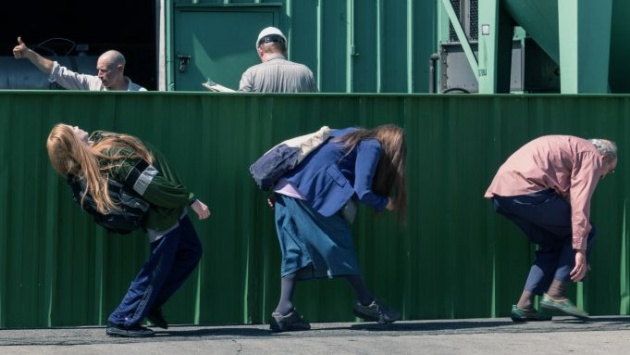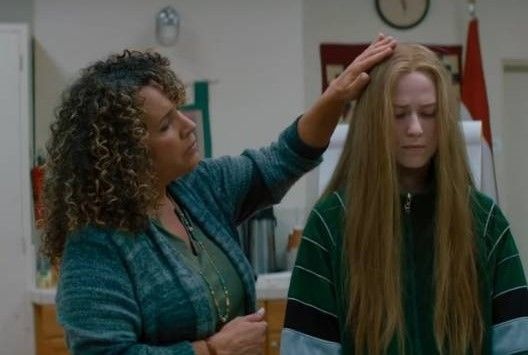
Pictured (left to right): Old Dolio (Evan Rachel Wood) and her parents Theresa (Debra Winger) and Robert (Richard Jenkins) sneak back into their lodgings, a disused office, in a scene from the film, 'Kajillionaire', written and directed by Miranda July. Still courtesy of Focus Features / Universal Studios
Contains spoilers
As Old Dolio Dyne, the twenty-six-year-old daughter of Los Angeles-based grifter parents, Robert (Richard Jenkins) and Theresa (Debra Winger), Evan Rachel Wood radiates loneliness to an almost thermonuclear level. Her long straight hair that she shares with her mother obscures her face. She is achingly self-conscious, having been taught not to be seen. She cannot bear to be touched either, having been shown no physical affection by her parents, much less been referred to as ‘hon’ or ‘sweetheart’. Named, as we discover late in Miranda July’s third film as writer-director, Kajillionaire, after the heir to a fortune, Old Dolio is the brains of her parents’ hand-to-mouth operation. The three of them live in unusable office space adjacent to a bubble factory. Each day, metronomic so you can set your watch to it, pink soap bubbles seep through the wall. The three of them work to quell the soapy infestation; it is part of the terms of their lease. The family owes their elderly landlord $1,500 in back rent. They have until Friday, or the following Friday – deadlines are elastic – to find it.
Wood is impressively athletic in a role that requires her to appear in every scene. At the start, she and her parents disembark from a bus outside a post office, waiting to make an approach. When Robert shouts ‘clear’, his wife contradicts him, and then vice versa. Eventually Old Dolio leaps into action evading the surveillance cameras and slipping inside to open a post office box for the purpose of stealing mail from the boxes next to hers. Today’s takings are limited, a stuffed toy and a tie that Robert is convinced is worth something. They move on to their next grift, returning a stolen watch for the reward; Old Dolio dresses in a Hogwarts-style school uniform to explain that she found it outside. When she does not return with money, Robert chastises her. ‘You told me not to ask for a reward,’ Old Dolio says in a low voice that akin to a surly teenager. ‘Plan one was not to ask for a reward. Plan two was to ask for a reward,’ Robert snaps. Old Dolio did however return with a gift certificate at a new age store, worth according to Robert’s characteristically heightened expectations, $200 or $300. Old Dolio attempts to get a refund or at least an object (‘that rock’). The assistant (Da’Vine Joy Randolph, last seen opposite Eddie Murphy in Dolomite is my Name) can only offer her a sixty-minute massage. ‘Make it twenty-minutes,’ says Old Dolio lying face down on the massage table, her face cushioned by a support. As the assistant touches her, Old Dolio shudders. The assistant stops, holding her hands above her bag. ‘Is this better?’ she asks, not touching Old Dolio. ‘Yes,’ Old Dolio replies, a tear dripping from her eye. Just then, her parents appear to ask if they can trade in the remaining forty-minutes of her massage. ‘How about that rock?’ asks Robert.
Inasmuch as there is a plot, it involves Old Dolio’s attempt to raise $1,500 to pay said landlord. She has won tickets to fly to New York. She comes up with a plan to say that her luggage has been lost on the return flight; if her claim is accepted, the airline will pay out $1,575. Robert, who lives in expectation of ‘the big one’, an earthquake, has a terrible flight, squirming in his seat uncomfortably. There is a poignant moment when Old Dolio looks out from the airport to the environs of New York City, a place she will never visit, before the family flies back to Los Angeles, with Old Dolio and her parents in separate seats.
Inasmuch as there is a complication, there is Melanie (Gina Rodriguez), the daughter of a realtor, who is seated next to Robert and Theresa. She is fascinated by them. As far as we can work out, Melanie is apartment-sitting for her mom. She also visits old people who are prime marks as far as Old Dolio’s parents are concerned. (Primark, incidentally, is the name of a clothing franchise in the UK; why have customers, ripped off by the cheap merchandise, not worked out that they are the prime marks, that is, potential victims of a swindle?) Old Dolio watches Robert and Theresa partake in airline booze that they can’t normally afford – I think Melanie is paying – and watches the stranger with envy. They treat her like a daughter; they see her.

Pictured: 'There are security cameras in every second aisle.' Old Dolio (Evan Rachel Wood, right) schools Melanie (Gina Rodriguez, left) in the art of shopping without money in a scene from the film 'Kajillionaire', written and directed by Miranda July. Still courtesy of Focus Features / Universal Studios
At the baggage reclaim conveyor belt, Robert, Theresa and Melanie take Old Dolio’s bag and Old Dolio makes her claim. While the family are on their travels, July cuts to bubbles taking over their room; they have a big mess to come home to.
Melanie becomes the family’s new best friend and introduces them to one of her old folks. Melanie has ambitions of running an antiques stall and marvels at the bric-a-brac in an old woman’s house. Meanwhile, Robert and Theresa search for her cheque book, remove a cheque and cash it. They have $300, more than any of their recent scores. They try the trick again at an old man’s house. The door is open. They make use of the kitchen. The homeowner is in bed, medical tube to his nose. Old Dolio discovers him. An awkward moment is shared. He can’t say much. She generally doesn’t speak, or at least does so reluctantly. At a certain point – this might be it – there is a shift in Old Dolio. She isn’t content anymore.
The family visit a hot tub store and Robert gets excited. ‘You mean I can walk out of this store with a hot tub for $150?’ he asks the salesman as if a credit agreement is something to be forgotten. In a surreal, slightly absurd scene, the family is invited to sit inside an empty hot tub, to imagine it filled with water. (They have no shortage of bubbles at home.) Robert buys the hot tub as if for a scam in the making.
Typical of her parents, Robert and Theresa send Old Dolio back home to deal with the bubble infestation. She bends her back, limbo style, walking past the bubble factory to avoid being seen by the family’s landlord. She finds a letter – a cheque from the airline. Their immediate problems could be solved.
However, Old Dolio doesn’t like the way her parents have withheld their affection, addressing Melanie by ‘hon’ and ‘sweetheart’, words they never call her. Robert explains that they thought such words would be patronising. Old Dolio is more like a surly teenage boy than a young woman; her voice is low like a boy’s too. It is as if her parents had raised her to be androgynous; not to be seen by either gender. Showing them the cheque, she offers her parents $1,575 to use those words with her. ‘For $1,575, I will call you ‘hon’ and ‘sweetheart,’ says Melanie. Old Dolio leaves with her and stays at her apartment. She cashes the cheque.
Meanwhile, the hot tub has been delivered to their address and Robert makes use of it. In one scene, he appears to make a pass at Melanie, asking her to join him. Melanie is offended and doesn’t take up the offer.
Robert and Theresa appear to be conscience-stricken. They leave 17 years’ worth of presents at Melanie’s apartment, one present for each year of her life. Old Dolio opens them one by one and leaves them on the carpet in a long row. The 18th birthday present, a necklace, is presented at a dinner, where, coincidentally the masseuse works as a waitress. The reconciliation is not complete. Towards the end of the movie, Melanie and Old Dolio end up in a darkened garage restroom. Then the ‘big one’ happens. Eschewing naturalism, July has the pitch-black restroom filled with stars. Old Dolio leaves the restroom suddenly invigorated. She goes into the garage and remarks to the guy behind the counter that he must be happy to work in a place with so much stuff to try. Accumulating a bunch of snacks, Old Dolio is about to pay for them when Melanie reminds her that it is her money. Old Dolio leaves them behind. She is a changed young woman. She returns to Melanie’s apartment, placing the money in a key box. The next morning, the two women awaken to discover that Melanie has been robbed. They are left with Old Dolio’s birthday presents. Thoughtfully, Robert and Theresa have left the receipt. In the final scene of the film, they return all the presents to a single store, even the necklace around Old Dolio’s neck. The value of the gifts is $525, exactly one-third of the cheque Old Dolio received. The family always divide up their takings equally.
Reviewers have been at odds trying to classify July’s form of comedy. One reviewer likened it to a ‘Saturday Night Live’ sketch that goes on too long. There is a subplot in which Old Dolio earns $20 by attending a neighbour’s maternity classes where she learns about the instinctive search for a source of nurture – a baby crawling towards its mother’s breast. Old Dolio attends more than one class, which has a therapeutic value for her, getting in touch with her primal feelings.

Pictured: Old Dolio (Evan Rachel Wood, right) attends a maternity support class in the film 'Kajillionaire', written and directed by Miranda July. Still courtesy of Focus Features / Universal Studios
Essentially, this is a film with a generic plot: a young woman discovers the love of her life and leaves her parents behind. The ending is a happy one, of sorts. Yes, Melanie has been robbed, but she has Old Dolio. July understands that the maxim, ‘true love conquers all’ is absurd. She heightens elements in her story to draw attention to that absurdity. Things that ought to go together – bubbles, a hot tub – don’t. The soap bubbles that appear through the wall are a metaphor for sentimentality and pat conclusions kept at bay. Robert and Theresa may not be that successful, but they are hardened criminals. They are true to their nature. They aren’t redeemed or excused for their criminality. At some point, they made a choice and stuck to it. However, as their child, Old Dolio shouldn’t be defined by their choice and, at the end, transcends them. The earthquake is a metaphor for the rupture of the family unit – the severing of Old Dolio from her parents.
You might ask yourself why July uses such a metaphor-heavy, light comic way of dealing with family issues. I always believe that content determines form. July wanted to tell the story of Old Dolio’s liberation and in doing so did not want to punish her parents. In a sense, Robert and Theresa relieve Old Dolio of the responsibility of her crime by taking the money. They not only share the takings but also the blame. They are participants in Old Dolio’s liberation, facilitating her escape from her background.
July is also able to eschew the conventions of a drama that might see Robert and Theresa apprehended and punished for their crimes. In July’s world, crime pays, but slightly less well than a regular job. Moreover, criminals live more precariously than the rest of us; perhaps we should be more sympathetic to them, not because they harm others, but because they live uncomfortably, always under the pressure to earn a living.
This makes Kajillionaire a subversive movie, twisting the values that we hold dear. Of course, there is whole cinematic tradition of audiences being complicit with career criminals, for example, in the Ocean’s Eleven movies, because they steal from even worse criminals than they are. July doesn’t make us like Robert and Theresa. At only one point, when Theresa puts on an accent, do we laugh with them. July doesn’t romanticise crime; she romanticises bonding – and that’s okay.
Reviewed at Arthouse Cinema, Crouch End, North London, Monday 12 October 2020, 20:45 screening



